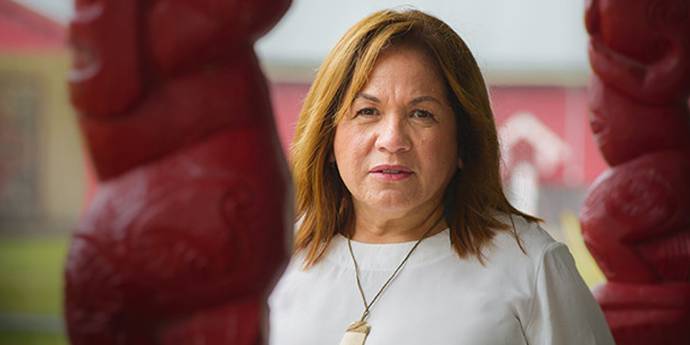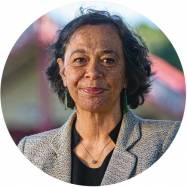Governance news bites – 13 June
A collection of governance-related news you might have missed in the past two weeks.
Hinerangi Raumati-Tu’ua MInstD on the value of elders, cultural values and making room for Māori to be part of leadership.

Photo: Trefor Ward
Ko Taupiri te maunga
Ko Waikato te awa
Ko Tainui te waka
Ko Waikato te iwi
Ko Tūrangawaewae
te marae
Ko Pōtatau te Tangata
Ko Taranaki te maunga
Ko Urenui te awa
Ko Tokomaru te waka
Ko Ngāti Mutunga te iwi
Ko Urenui me Parihaka
ngā marae
Ko Raumati te tupuna
As a child, Hinerangi Raumati-Tu’ua often spent time at Tūrangawaewae Marae, at Ngāruawhāia, while her parents, Tommy and Lorraine Raumati, worked to host the many dignitaries and government representatives visiting the official residence of the Māori King movement, founded in 1858.
She observed the quiet but persuasive leadership of the late Māori Queen, Dame Te Atairangikaahu ONZ DBE OStJ. Now, among other leadership roles, she chairs the Tūrangawaewae Trust Board.
I was about 30 when I got my first governance appointment as a board member of Trust Waikato. There was a growing call for Māori, women and younger people to go on boards and — even back in the late 1990s — a recognition that most of these boards were run by elderly Pākehā men. I was appointed, partly because I was young and Māori and a woman, but also because I had finance and accounting experience — the technical capability.
I found I enjoyed being around a table with wise people. And to me, that’s part of the enduring value of having older ones around you. Wisdom comes with age and experience, which youthful exuberance and energy can’t replace. It gave me a good blueprint for how to behave, get things done, and work with the talent around me.
I am very much a reflection of my parents and their elders. Dad was brought up at Parihaka, where he didn’t have much material wealth but still felt that he never went without. He was practical and a problem-solver. He passed away in 1996, and our family still miss him dearly. My mother is a very smart woman who grew up at Tūrangawaewae and remains active there today.
My parents grounded their children in mahi (work) and service — they were level-headed people who just got on with it. I am also the very proud mother of two sons with my husband Lala Tu’ua — my 18-year old stepson Kobe Fuli-Tu’ua and seven-year-old Naotala Thomas Raumati-Tu’ua.
I was a financial accountant when I started working with the Tainui Corporation, which then evolved into Tainui Group Holdings. I became the CFO for Tainui in 2003. In about 2005, I attended a Federation of Māori Authorities (FOMA) conference and spoke on behalf of our organization, and from there, was approached to consider other key governance roles.
After being appointed to Trust Waikato, I was appointed to Te Ohu Kaimoana, a charitable trust established through the Māori Fisheries Act 2004 that represents the collective interests in fishing and fisheries-related activities of 58 iwi organizations.
Not long after that initial approach at FOMA, I was elected by my Taranaki whānui (wider tribe) onto the Parininihi ki Waitōtara Trust. At the same time, I did a short stint on the audit and risk committee of Te Wānanga o Aotearoa, where I would later go and work as the executive director of operations. Interestingly, it was when these two organizations were coming out of or heading into choppy financial waters. Having been through similar issues with Waikato Tainui, I benefited from knowing what you needed to do in situations like this to help steady the ship.
In the past 10 years, we’ve seen the benefits of learning from previous situations. Across Māoridom, we’ve worked out what is important in governance models at a tribal and corporate level. Essentially, it’s having cultural values that set us apart from being just another mainstream company. Having a vision is important; it keeps you focused on the job, not distracted by what can look shiny or new. You then focus on having really capable people with you and thinking more about what people bring to the table instead of how they got there.
The fundamentals are essential, too, especially in the commercial world, as it’s challenging to keep an organisation running well, trying to meet your tribe’s objectives and vision, and at the same time, make money. Twenty years ago, I would articulate the need to achieve tino rangatiratanga (political control by Māori people over Māori affairs).
The governance entities imposed on us as part of the settlement arrangements with the Crown were problematic for our people to relate to or engage with. My aspiration has always been that our people can see themselves fully participating in all aspects of their post-settlement world. Now I talk about mana motuhake (autonomy, identity, achieving our potential) as a more tangible way to actively participate in growing our tribal identity and wellbeing.
In the world of corporate governance and directorships, it’s about making room for Māori to be part of the leadership. It means stepping beyond the thinking of having that one Māori at the table, to saying, ‘Let’s go and find the best people we can and let’s assume that they’re Māori.’ It’s a slightly different approach that I believe will yield beneficial results.

Amokura Panoho has over 30 years experience in relationship management and engagement, leading community and people centred strategy development, planning and delivery programmes. Her professional roles have included public service union organisation, managing government funding programmes and developing Māori Land Incorporation grants programmes.
Amokura has chaired Parihaka Papakainga Trust negotiations with the Crown, been an elected board member for Te Atiawa tribal authority, previously chaired NZ Māori Tourism to achieve core funding from government, and the inaugural chair of Shakti Asians Womens Centre negotiating their membership of the National Womens Refuge Collective. Presently she is the director for Te Matatini, Auckland Unlimited, and a trustee of Auckland Foundation, as well as a director of her consultancy Kura Consulting Limited and a freelance writer.

This article first appeared in NZ Life & Leisure magazine as part of Amokura Panoho's Hautūtanga leadership series.